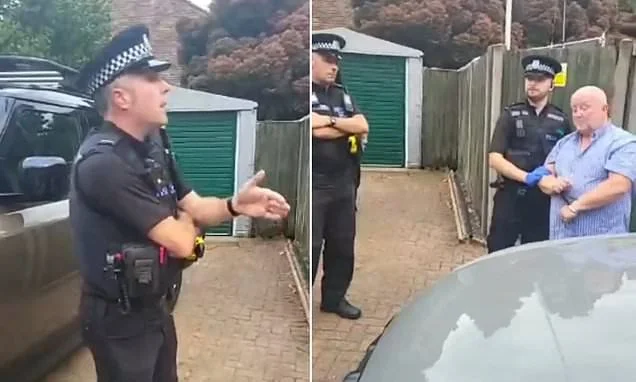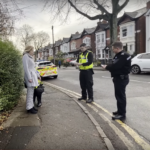Blog Post
Veteran arrested by police for “causing anxiety” to trans activists with social media post
When I first saw this video on Twitter, I thought there had to be some mistake:
“Someone has been caused anxiety based on your social media post. And that is why you’re being arrested.” British policing, 2022. pic.twitter.com/D4MZhbXq08
— Paul Embery (@PaulEmbery) July 30, 2022
That’s a middle-aged man, being arrested by police, for criticizing the trans movement on Twitter–and not a peep from the media so far until this short article from The Spectator yesterday:
Last week, I spent a night in a police cell. My ‘crime’? To intervene after I witnessed an ex-soldier being arrested over a social media post.
Is what someone posts on Facebook – even if it is a distasteful image of a transgender pride flag in the shape of a swastika – really a matter for the police? I don’t think so – and in this instance, the law appears to be on my side. Yet Hampshire Police saw things differently.
‘Someone has been caused anxiety based on your social media post. And that is why you’re being arrested,’ a PC told the ex-army veteran as he stood outside his home in handcuffs, surrounded by officers. The backlash to the arrest has been swift: Hampshire police and crime commissioner Donna Jones has even stepped in to criticise officers.
‘I am concerned about both the proportionality and necessity of the police’s response to this incident,’ she said. ‘When incidents on social media receive…two visits from police officers but burglaries and non-domestic break-ins don’t always get a police response, something is wrong’.
Hampshire Police have since said that no further action will be taken against a man who was arrested on suspicion of sending by public communication network an offensive, indecent, obscene, menacing message or matter. I remain under investigation on suspicion of ‘obstructing a constable in execution of duty’.
But the truth is that, whatever happens now, incidents like this will keep occurring. The College of Policing’s latest hate crime guidance, published last month, was intended to address the most egregious examples of police overreach. It has failed: the updated guidance still runs the risk of turning sarcastic expressions of dissent into something much more dangerous. ‘Ill-will’, ‘ill-feeling’, ‘antagonism’ and ‘dislike’ remain defining factors in the CPS’s definition of hate. This is wrong.
There’s also another issue in the legal system that this case has exposed: the use of summary justice. The officers told the man who made the social media post that he could attend a community resolution course and that this would also cost him £60, or he could face prosecution. Hand over the money and sign a confession and they would call off the dogs, seems to be the logic at work here.
The veteran, who has three tours of duty and a chest of medals, explained that he was not about to seek permission every time he wanted to post on Facebook and therefore declined their generous invitation. This led the officers to make the decision to arrest him. The veteran asked what the charge might be. No answer was forthcoming.
‘You just conducted an illegal shakedown,’ I said, as I emerged to confront officers. We attempted to resolve the situation peacefully by handing the officers a letter before action addressed to their chief constable. ‘Take it yourself,’ they said. ‘We’re not postmen.’
The officers then made their arrest. I immediately placed myself as a barrier between the war veteran and the officers. ‘To arrest this man, you will have to go through me,’ I warned. It may turn out to be the proudest moment of my life.
That article was written by Harry Miller, the docker arrested himself a couple of years back for tweeting a limerick about the transgender movement.
So just in case you’re keeping score: Police officers are arresting people for posting criticisms of the trans movement on social media because those posts “cause anxiety” to transgender activists.
This is the sort of thing that we were told was a crazy conspiracy theory.








